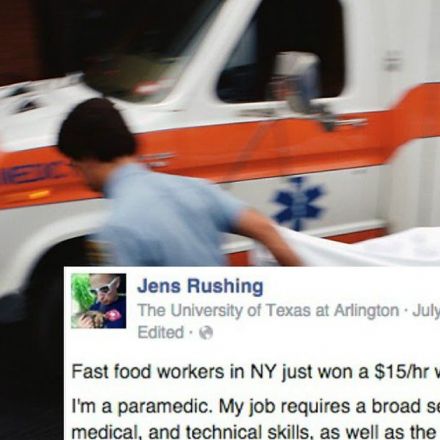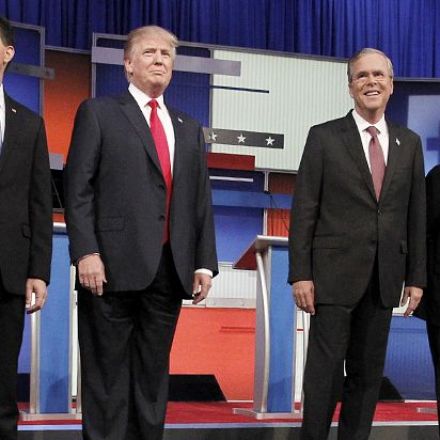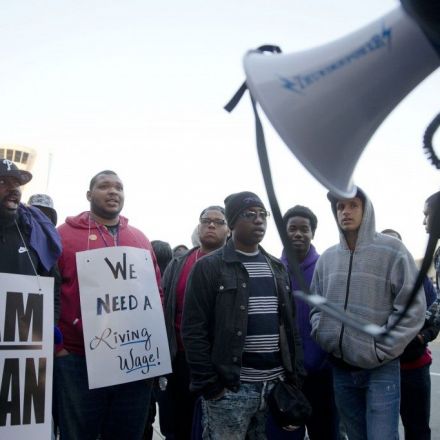Thank you
Your email has been added to our waiting list and we will send an invite to you as soon as possible. Thank you for your patience.
In the meantime, if you happen to run a blog, our newly launched Blog Enhancement Suite can utilize the immense power of community to help you get more audience, engagement, content, and revenue with your own embeddable community! It will breathe new life into your blog and can automate many of the tedious tasks that come with the territory, so you can focus more on what matters most... writing.
Help spread the word about Snapzu:
Let others know about Snapzu by tweeting about us. We appreciate every mention!
Tweet it!





























Join the Discussion
The more I've been thinking about minimum wage, as its been in the news, the more I'm convinced we should be talking about Welfare at the same time. They're effectively two sides of the same coin.
Welfare is set up because it has been determined that a certain threshold is needed for an American citizen to live a decent enough life, but the fact that this is not tied to minimum wage somehow creates an interesting effect. What we see is that many employers, Walmart in particular has been in the news for this, use Welfare programs as effective subsidies to their employee wages. Instead of paying their employees a living wage, they pay them a different amount and let the government (and ultimately taxpayers) foot the rest of the bill.
I'm personally of the opinion that minimum wage should be set such that a single parent (with one child) is ineligible for at least the majority of welfare benefits if they are working full time. The current cutoff for SNAP (food stamps) is $1705/month for a 2 person household, which comes out to about $10.65/hour at 40 hours a week. At 30 hours/week, the minimum to be full time for ACA, that's about $14.20. And that's just one program. Two people earning minimum wage and a single child at 40 hours/week get a little over $200/month from the EITC. A single parent making $7.50/hour is getting $275/month, almost an additional 25% of their salary.
Without tying these programs together, we create this weird divide. What exactly is minimum wage for, if not to guarantee a living wage? Many of these people have been making $15+/hour already, except that the tax payers were footing the rest of that bill.
That's an excellent point. The issue should be framed as follows: Who is responsible for paying the cost delta between minimum wage and a living wage; should it be the government aka the taxpayers, or should it be the companies that employ them? I'm certain a lot more conservatives would get on board the minimum wage movement if it came with the promise that the welfare system would be greatly reduced in size.
Your points are quite spot on. But I think just questioning the status quo is a good place to start. We can't find solutions to these real serious questions until we examine the whole issue.
I think tying Welfare to Minimum Wage is a great idea, it accomplishes a litany of issues all on its own. But the fact remains- if you're spending 40hrs a week at a place, you deserve a living wage. There are certainly questions to answer before such a drastic step can be taken world wide, like what about a 'snot-nosed kid' at his first job? Does s/he deserve a 'living wage' if they are just going home to life off Mum and Dad? I should think not, unless they are supporting someone & can prove it. For me it boils down to this- If your company is making Billions in profits and still relying on government subsidies to pay their employees, well guess what? That's wrong no matter how you slice it. It needs to be brought to an end immediately. I don't mind my tax money going to help my fellow man. But I do mind when my tax money is lining the pockets of the Wal-twats, the McDouches and their ilk.
I think its easy to address the 'snot nosed kid' angle; workers that are minors and are claimed as a dependent of someone else's tax return have a lower minimum wage than someone who is not a dependent.
Edit: Skolor raises a good point below. Also in hindsight having a two-tiered minimum wage would just encourage employers to favor minors and dependents over others, which would undermine the whole point of increasing the minimum wage.
Is that really a problem that needs to be solved?
A comparable problem: I work as an engineer, and I'm married. Because of my status outside work, I get paid more than the guy who sits beside me. My employer ends up paying (slightly) more for my healthcare costs, due to also paying for my partner. On the other hand, I get paid a fair bit less than the guy a few offices down, because he is not only married but also has a couple kids. Its not a huge difference, compared to our total salary, but it's my understanding it gets closed $1/hour difference between a single guy and someone who has a bunch of kids. If we're all doing the same work, and performing the same, why is one person getting paid more for something they choose to do outside of work?
I see the issue of dependent workers the same. If two people do the same work, with the same level of performance and experience, they should get paid (roughly) the same. Keep in mind, at current minimum wage, a difference of $50/week is a 17% increase in pay, if full time. That's a pretty big difference if the only change is your parent's tax status.
"How incredibly petty and counterproductive is it to fuss that their pile of crumbs is bigger than ours? Put that energy elsewhere. Organize. Fight. Win." This is so spot on! The argument shouldn't be that others don't deserve a living wage; it should be that you deserve one too. Any employer that wants your time and labor should be willing to pay their employees enough to live on, not just barely survive.
Saying "everyone deserves a living wage" is not an argument. It's an assertion. The question remains: Why would everyone deserve a living wage?
There are other questions that would need to be answered too, such as: "What's a living wage anyway?", "What about the financial viability of paying everything twice the current minimum wage?" or "What about all the jobs that don't get created because some people are just not worth $15/h?"
The business owners act according to their incentives too: http://www.thegatewaypundit.com/2015/06/mcdon...ounces-its-answer-to-15-an-hour-minimum-wage/
The idea that we all "deserve" a "living wage" is comforting to people who are insecure about their ability to provide for themselves.
But what does it mean to deserve a certain salary and how can you determine how much it should be?
For example, how much did Steve Jobs deserve to be paid, for creating countless jobs all over the world and enabling countless business enterprises based on Apple's ecosystem of products and software? Did he get what he deserved? Who's to say?
Put simply, because everyone is a human being. We have the total wealth to provide for everyone's basic needs, but we don't do it because capitalism. Gotta scrape in every last dime for myself.
OK, so if employers have to pay you more because you're a human being, then I guess you'll have to pay more for goods and services because businesses are run by human beings too, and they Deserve more money than they get now too?
Businesses are not human beings, they are an idea. Businesses are run by human beings. Those human beings deserve the same basic rights as the people working for them. Anything extra is not a basic right. So no, businesses do not deserve more money.
Exactly! So the business-owner-human-beings Deserve to get paid much more than now, and therefore you have to pay double-price for their goods and services. That's fair and just.
Note that I don't actually believe that. I'm just trying to illustrate why the idea of workers "deserving" more because they're human beings makes no sense.
No, you're missing the point. There's a baseline that ALL human beings deserve. Food, shelter, clothing, healthcare, education, INTERNET ACCESS, etc. Anything on top of those basic necessities is a luxury. Business owners get all of that plus more. If the business fails, they deserve to lose those luxuries, but not the basic necessities.
Right now, workers do not get all of those things as a basic, guaranteed necessity. We're talking about bringing the bar up to the bare minimum.
Put even simpler, everyone deserves $10. Workers get $6. Business owners get $15. You're arguing that if workers get $4 more so that they get $10, then business owners deserve $4 to get $19. That's not how this works.
Yeah, that's not how that works, but that is how being objective would work. If everyone deserves more because they're human beings, then they all deserve equally more (regardless of whether they're the employer or the employed)
No, you are completely ignoring my point. Everyone does not deserve MORE, everyone deserves a BASELINE. We don't get more money until everyone's basic needs are met. When everyone's cup is full, then you can start buying more cups. The employers' cups are full right now and the employees' are not.
If everyone gets more at a flat, lump sum, it does nothing to change the inequality.
I think I'll just go ahead and remove Snapzu and Hubski from my Firefox now.
Not necessarily. Taxpayers already have to subsidize workers with an income below the poverty line through paying them welfare benefits. If the minimum wage were adjusted so that a full time independent worker making minimum wage would have earnings at just above the poverty line, in theory this would just shift the welfare cost from the taxpayers to employers. Taxpayers would pay less in taxes which would offset the increased cost of goods and services. I'm no economist, but it seems to me that it would be a wash.
Um.. I wasn't being serious.
I was just trying to illustrate why the idea of workers "deserving" more because they're human beings makes no sense.
But in general, we all want as much as possible for as little as possible. That includes employees and employers alike. That's why people and businesses get paid whatever they can get someone to voluntarily pay for their goods and services.
You bring up some useful questions but examine the opposite of the assertion (with some parameters interspersed): a person working fulltime at a job does not deserve to make wages above the welfare designated poverty level.
Its a ludicrous statement.
It is always in the best interest of the upper classes to keep the middle classes blaming the lower classes.
I think that america has switched from "How can I do better for myself/family" to "why does he have more than me? It isn't fair." I don't understand that mentality.
Is there a direct link to the quote?
here you go
Thanks! This is exactly what I've been thinking this whole time. Glad it's getting attention.
This comment has been removed